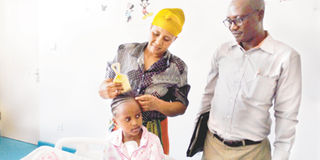Pacemakers give Tanzanians new lease of life

Happiness John being plaited by her Mother Elitruda Malley as JKCI Public Relations Officer Mr Mohammed Maulid looks on recently. Photo|file
What you need to know:
- “My daughter Happy did not grow up like other children,” she told Your Health in a phone interview last week from Arusha where they reside. Her voice, firm with each word, she recalls how Happy started fainting, often and abruptly when she was three.
- Happiness John has lived with a severe heart defect for five and a half years. She is now six.
There are many things that Elitruda Malley had considered normal when her daughter was concerned. Phrases such as ‘Happy ameanguka’ (Happy has fainted) or ‘Mama sijisikii vizuri’ (Mother, I’m not feeling well) echoed in her ears for five long years.
“My daughter Happy did not grow up like other children,” she told Your Health in a phone interview last week from Arusha where they reside. Her voice, firm with each word, she recalls how Happy started fainting, often and abruptly when she was three.
Happiness John has lived with a severe heart defect for five and a half years. She is now six.
“We would take her to Selian Lutheran Hospital in Arusha where I was told by the doctors that she had a heart problem. However, she was too young to get any major treatment,” says Happy’s mother, also well known as Mama Happy.
Happy’s heartbeat was between 24-28 (beats per minutes) as compared to the normal heartbeat of a child that ranges between 89-110 (beats per minutes).
“It reached a point where her condition worsened. She would pass out while eating since the process left her exhausted,” she recalls, her voice growing weaker with each word. Mama Happy went on to say, “She would be in school for a week and then sick in bed on the following. One week she is attending school and the other week she is ill in bed. Life became dark and dull.”
A rare breakthrough
In April this year, Mama Happy took her daughter to Jakaye Kikwete Cardiac Institute (JKCI) in Dar es Salaam. Happy was diagnosed with a rare condition of congenital heart block, an uncommon occurrence affecting 1 in 22,000 live births.
Congenital heart block is characterised by interference with the natural conduction of the nerve impulses that regulate the normal, rhythmic, pumping action of the heart muscle, according to the medical sources.
The doctors advised that Happy go through surgery to have a pacemaker implanted in her. There was one thing standing between her and a healthy life: Sh8,000,000 ($3,600).
“The health insurance refused to pay the bill. Two months passed and there were no leads. I felt hopeless and wanted to give up. It was the hardest time of my life – to have the solution in front of my eyes but not have the means to grab the opportunity and save my baby’s life,” says Mama Happy.
In July, she received a call from her doctor at JKCI. She was told to take Happy to the hospital as there were specialists from the United States available to do the surgery. “The specialists had only come with pacemakers for adults but I felt a sense of hope,” she says.
In the same month, arrangements were later made with the health insurance, which made the procedure possible.
“I cannot forget the date of July 15, 2016 when my Happiness got a new lease of life,” Mama Happy says and recalls how she was glowing with joy.
She’s the first Tanzanian child to go through a permanent pacemaker insertion surgery at the Jakaye Kikwete Cardiac Institute, making her the youngest pacemaker recipient since 2013.
Happiness’s surgery was remarkable not just because the permanent pacemaker procedure was performed on a child but because with her condition, she was able to withhold and survive for these many years.
Dr Tulizo Shemu, a cardiologist at JKCI tells Your Health that the majority of the permanent pacemaker insertion procedures are done on middle-aged adults to the elderly, but Happy’s case was a rare one.
“A pacemaker is placed due to abnormality or irregularity in the heart rhythm. Ageing, cardiac related diseases, hypertension, trauma, coronary artery diseases, surgery, heart attack and diabetes can cause the abnormal heartbeat,” he explains.
Happy’s life has now entered a new chapter and so has her mother’s who is a practicing nurse.
“Her weight has increased from 14 kilograms to 19.5 kilograms after the surgery. She can now play with her friends, she attends school regularly, she has not fainted, she goes to the church on her own and I see that she is feeling great.”
New rules
Happy always carries an ID card that identifies her as a pacemaker patient. She has to carry it wherever she goes, as there are few rules a pacemaker patient like her has to abide by. Her mother explains some, “She has to be 30cms away from a mobile phone when off and 60cms away when on, she is not permitted to hold the phone using her left side of the arm, she has to avoid scanners at the airport and malls, she cannot undergo any radiation emitting procedures such as x-ray and has to be careful in going too near to mobile or satellite towers.”
Happiness doesn’t wear the ID card all the time. It is only when she goes to places that have devices that can cause interference such as hospitals, airports, malls.
Mama Happy advices Tanzanian parents not to think that this is witchraft when they see such a condition in their child.
“I too fell in the hole and I used to take Happiness to witchdoctors. But I was wrong and I don’t want my fellow Tanzanians to fall in the same trap. They should go to the hospital, whether they have money or not, I can guarantee you that if you have faith, you will be helped. Your sons or daughters can get a new life just like my daughter.”
Pacemaker and the elderly
According to Kulindwa Kasubi, Cardiovascular Technologist at JKCI Catheterization Laboratory, 21 pacemaker insertion procedures have been conducted this year. “Most pacemaker surgeries are done on the elderly, at the age of 50 and above. The procedure can take 45 minutes up to 2 hours,” he says.
A pacemaker procedure at JKCI can cost between Sh8,500,000 to Sh10,000,000.
Mwita Possi (68) from Dar es Salaam is one of the elderly pacemaker recipients whose insertion was done this year. He was employed as an Industrial Safety professional at Tanzania Zambia Railway Authority (TAZARA). In his mid 60’s he started experiencing shortage of breath and tiredness while walking a short distance.
He started fainting, first experiencing light-headedness and then complete blackout. His heart rate would increase. For a year, his symptoms were diagnosed as vertigo, a condition where you sense spinning, usually caused by an inner ear problem. He got medication for both vertigo and blood pressure to control and improve his condition.
The medications Mwita received were taking a toll on his health. The condition went from bad to worse. He would pass out in the middle of the night, his heartbeat would drastically slow down and he felt weak doing nothing. This went on for a year.
He referred another hospital for a second opinion and it is early this year that he was diagnosed with a heart problem. He was then referred to Dr Robert Mvungi, a cardiologist at JKCI who performed the permanent pacemaker insertion.
The now retired Mwita is now well. “I was lucky enough to have met my cardiologist who was able to catch my sudden drop in heart rate and put a permanent pacemaker in me. I knew nothing about them, but now I feel great. I drive, I no longer faint and I’m living a completely ordinary life,” Mwita said in an interview with Your Health.
A second life
Cleophas Mzamala, a 53-year-old police officer from Kurasini has always kept himself active and enjoyed his work. But sometime in his late 40’s, he collapsed suddenly on three separate occasions.
“It was like a switch of light in the brain suddenly turning itself off – one minute I am standing or walking and feeling fine and the next minute I experience a complete darkness,” Mzamala says.
As time went on, Mzamala could no longer attend to his duty on time and feared fainting while on duty. He visited a local hospital in Kurasini where he was diagnosed with having blood pressure complications. He was given medications accordingly.
However, his condition never improved. “I then met a doctor who looked closely at my situation and referred me to the cardiac institute in Muhimbili where I was not only diagnosed with a heart problem but I was also put on a permanent pacemaker,” said Mzamala.
Mzamala believes that having a pacemaker fitted seven years ago gave him a second life and a chance to change himself.
“Just like any other person, I too had some habits which aren’t worth mentioning. I felt I was granted a second life and I wanted to make everything right. I left all the bad habits that was causing a dent in my health and relationships and I am a happier person now,” he says.




